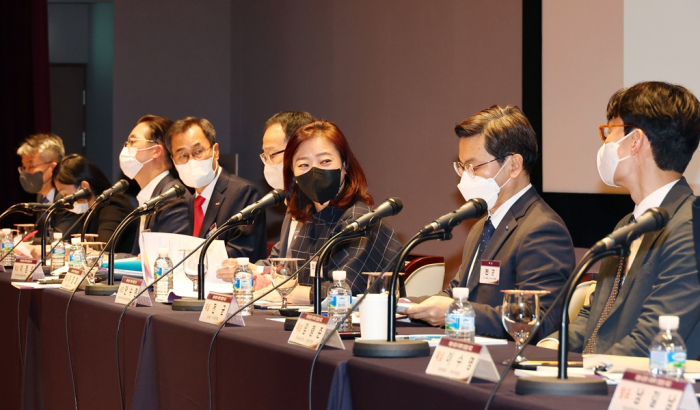Korean stock market
Korea to reform market rules to boost foreign investment
Foreigners are likely to be allowed to invest in S.Korea with passport numbers, LEIs; govt also set to improve IPO, dividend policies
By Nov 28, 2022 (Gmt+09:00)
3
Min read
Most Read
LG Chem to sell water filter business to Glenwood PE for $692 million


Kyobo Life poised to buy Japan’s SBI Group-owned savings bank


KT&G eyes overseas M&A after rejecting activist fund's offer


StockX in merger talks with Naver’s online reseller Kream


Mirae Asset to be named Korea Post’s core real estate fund operator



South Korea will reform financial market regulations to attract more foreign investments and to achieve MSCI Inc.’s developed market status for its stock markets.
The government preliminarily plans to lift registration requirements for foreigners and make English corporate filings mandatory, while enhancing the local initial public offering market system to improve investor confidence, the country’s top financial regulator Financial Services Commission (FSC) said on Monday.
“We must take bold steps to break and innovate the existing old and familiar framework so our capital market has a system suitable for its changed global status and to fulfill its duties in the new era,” said FSC Vice Chairman Kim So-young in an opening speech at the Korea Discount Relay Seminar.
The Korea discount refers to a tendency for domestic companies to have lower valuations than global peers due to factors such as low dividend payouts, the dominance of opaque family-run conglomerates known as chaebol and geopolitical risks involving North Korea.
MSCI, which has categorized South Korea’s stock market as an emerging market for decades, has mentioned the country’s poor market accessibility, largely due to the lack of an offshore currency market, as the most significant reason for its refusal to grant developed market status to the country.
Market accessibility is one of the key criteria alongside economic development, market size and the level of liquidity for MSCI to categorize a country as a developed, emerging or frontier market.
In its recent accessibility review, the global index provider reiterated that the existing four conditions were deemed negative for Korea's upgrade: equal rights to foreign investors; foreign exchange market liberalization level; investor registration and account set-up; and information flow.
TO LIFT REGISTRATION REQUIREMENTS FOR FOREIGNERS
The country will abolish the foreign investor registration rule, which was introduced in 1992 when the country opened its financial markets, the FSC said.
“South Korea is the only country among major developed nations to mandate a foreign investor registration system,” Kim said.
“The government will create an environment where foreigners can more freely invest by lifting the registration rule and allowing foreigners to use globally accepted personal passport numbers and corporate LEIs,” he added, referring to the legal entity identifiers introduced in 2011 by the Group of 20 (G20) nations.
TO IMPROVE IPO, DIVIDEND POLICIES
South Korea is also set to improve rules on IPOs by strengthening the role of bookrunners to enhance investor confidence, according to the FSC.
Demand for a listing from institutional investors has often been boosted during bookbuilding sessions partially due to nonexistent money amid a lack of regulations.
In January, LG Energy Solution Ltd., drew a record 11,500 trillion won ($8.6 trillion) in bids from institutional investors as small-sized asset management firms placed big bets on the IPO without having enough money, to raise their allotment chances in the highly subscribed IPO.
The country plans to expand the price range of newly listed stocks on their trading debut days in a bid to minimize distortions in share prices.
Last week, the FSC said it will revise the country’s dividend policy to improve predictability in line with global standards.
In South Korea, unlike other major economies, companies confirm dividend amounts weeks after the ex-dividend date, usually near the end of the year, after which stock buyers don’t receive dividends.
In advanced countries such as the US, Germany, the UK and France, companies determine the size of dividends before closing the year's books and decide which shareholders are entitled to dividend payments.
“Global dividend stock fund managers undervalue South Korean dividend stocks as ‘blind’ and are reluctant to invest,” Kim said, stressing the necessity to revise the policy.
The FSC is set to unveil final reform measures in stages from the next month, reflecting opinions from the seminar.
“We will gradually reform the system as stakeholders such as companies, brokerage houses and law firms are familiar with the existing practices,” said an FSC official.
Write to Hyeong-Gyo Seo and Dong-Hun Lee at seogyo@hankyung.com
Jongwoo Cheon edited this article.
More to Read
-
 Korean stock marketKorea to revise dividend policy to ease ‘Korea discount’ concerns
Korean stock marketKorea to revise dividend policy to ease ‘Korea discount’ concernsNov 24, 2022 (Gmt+09:00)
3 Min read -

Comment 0
LOG IN


